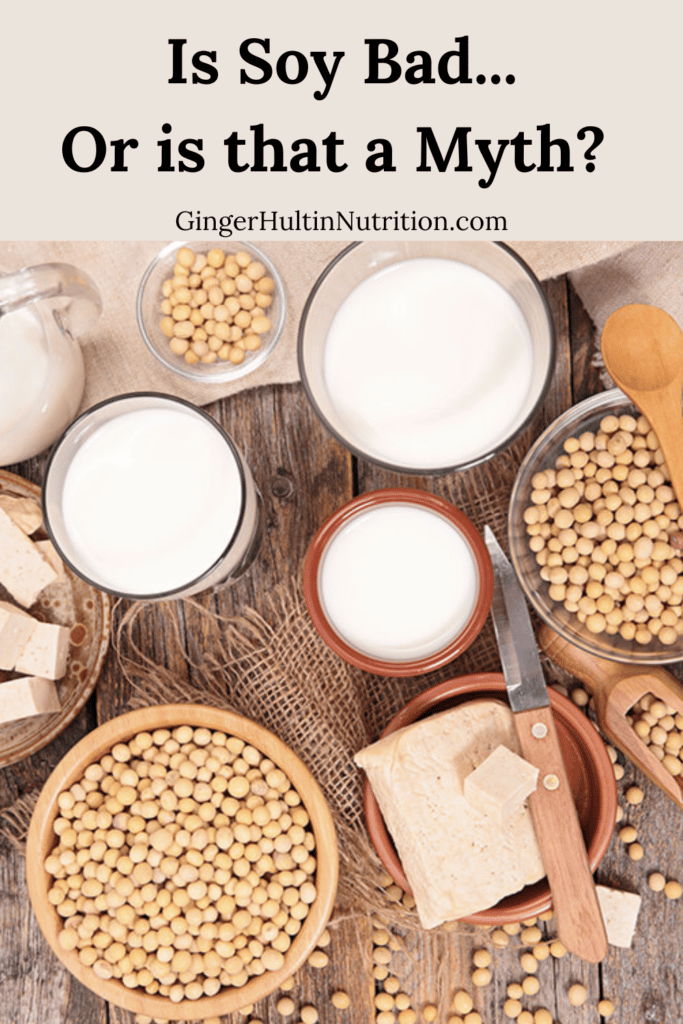Is Soy Bad…Or is that a Myth?
October 12, 2022 by Ginger Hultin MS RDN
When you hear about soy, what do you think? If you said cancer, bad, or even “man-boobs” you are not alone. Many people have negative connotations when it comes to soy. However, did you know that soy can be very helpful in fighting cancer? And spoiler alert, it does not cause Gynecomastia (the proper term for “man-boobs”). Although there is a common misconception floating around that soy is dangerous, this is not what studies are finding. So is soy bad? Read on if you are ready to update your understanding of soy and how it can benefit the body.

Does Soy Cause Cancer?
Eating soy has been shown to protect the body against some cancers and that includes prostate cancer. Soy is rich in antioxidants, including isoflavones. There is some evidence that these isoflavones in soy may help to stop cancer from spreading. But if this is the case, why do people continue to think soy is dangerous? Great question, I’m glad you asked. Let’s discuss.
There have been studies done on rodents that found that the isoflavones in soy can lead to an increased risk of breast cancer. Fortunately for humans, we process soy much differently than rodents, so this is not what occurs in our bodies. In the human body, these same isoflavones that increase the risk of breast cancer in rodents actually have been found to lead to no effect or they decreased the risk of breast cancer. Therefore, you can continue on enjoying your soy in peace.
Soy and Estrogen
So what about the estrogen we hear about in soy? The ‘estrogen’ in soy foods falls into a category called plant estrogens or phytoestrogens. These plant estrogens are found in many other healthy foods such as whole grains, legumes, and vegetables. So keep in mind that you probably are already eating these in many foods, every day. Plant estrogens have health benefits and they are NOT like the type of estrogen hormone in humans and animals.
Health Benefits of Soy
Soy foods have many health benefits to offer. Many of these foods are an excellent source of protein. It is especially important for your body to get enough protein when going through cancer treatment. Protein is a crucial building block of the body that helps promote a strong immune system to fight off infections and heal wounds. Protein also helps to maintain muscle mass during treatment and to recover from treatment. In many cases, eating extra protein during treatment is necessary and soy is a great option.
I mentioned earlier that soy contains antioxidants. Antioxidants are like magnets in the body helping to neutralize cancer causing free radicals. This helps to prevent cancer from occurring and to slow the spread of cancer once it has already appeared. Antioxidants are also anti-inflammatory.
Healthy Soy Foods
Soy is a very versatile food and as such is made into many forms. Edamame and tofu are two popular forms of soy that you are likely to see at the grocery store. Edamame are immature soybeans that can be eaten whole as a snack. These green little beans have not yet fully matured into the beige soybean we are used to seeing. Although they are not fully mature, they are still packed with nutrients. Edamame is high in protein, has been found to aid in lowering unhealthy cholesterol, and is rich in vitamins and minerals. Folate and vitamin K are two main nutrients in edamame. Never used edamame in the kitchen before, or just need a new and fun recipe? Check out my quick and delicious Lemon Edamame Hummus.
Tofu is a processed version of soybeans. ‘Processed’ does not always mean “bad.” So when you’re wondering “is soy bad?”, the answer is: it’s a bit complex. In this case, the processing that is required to take soybeans and transform them into tofu is similar to that of cheesemaking. Condensed soy milk is pressed into solid blocks, which is the tofu.
Tofu is rich in nutrients, including protein and calcium, and low in calories. Calcium is important for strong bone health. Additionally, the heart, muscles, and nerves also depend on calcium to aid in proper functioning. Tofu is a great substitute for any animal-derived protein. My Quinoa Protein Power Bowl Recipe combines the best of savory and sweet with tofu, greens, apples, and a touch of maple syrup to create the perfect lunch.
Soy can also be found in fermented forms. Miso and tempeh are two forms of fermented soy. Fermented foods provide a natural source of probiotics – good gut bacteria. A healthy gut can improve digestion, boost immune health, and aid your body in synthesizing vitamins.
So, Bottom Line: Is Soy Bad?
There are several scientific studies out there proving that the benefits of soy far outweigh any potential risk. In fact, some of the leading cancer research organizations suggest soy is beneficial for human health.
According to an article put out by the American Cancer Society, soy foods may lower your risk of breast cancer. Eating soy may even help lower cholesterol and has been linked to decreased heart disease risk. It also has some good evidence for supporting bone health.
If that’s not enough to convince you…The Dana-Farber Cancer Institute supports the consumption of soy for reducing the risk of certain cancers including breast, prostate, and gastric cancer. Their research has also found soy foods to be safe for cancer survivors. As always, it is important for patients with cancer to talk with their care team to develop a personalized plan tailored to the individual and their stage of healing.
The bottom line: soy is full of health promoting compounds and can even decrease your risk of disease. Enjoy your soy!
What is your favorite way to eat soy? Share with me in the comments your favorite soyfoods and how you prepare them.
8 Comments
Leave a Comment

Ginger Hultin,MS, RD, CSO
Thanks for visiting! If you're struggling with a cancer diagnosis, autoimmune condition, gut health problems, or even a medical mystery, nutrition can make a HUGE difference in your day-to-day life. I run a virtual, concierge private practice where I partner with my clients over time to help them improve their health through nutrition. Be sure to visit the blog for easy, plant-based, anti-inflammatory recipes and our "Resources" page for a variety of self-paced programs, books, e-books, and nutrition podcast episodes.







Great article! I love steaming edamame for a quick snack at home. I’m also a fan of using silken tofu in smoothies or to make homemade ranch dressing. thanks for the nice overview and reminder to “enjoy your soy!”
Oh that’s such a great idea – I need to find a recipe like that 🙂
I would argue that the jury is actually still out on whether soy is healthy or not. The data is conflicting and to go so far as to say it’s healthy may be a stretch. I would also love to see the study that proves that man boobs are not caused by estrogen.
There’s a huge difference between raw GMO soy protein and fermented soy and I’m not sure most of the studies out there differentiate between the two. Additionally, it may depend on your genetic makeup as to whether or not you can handle soy. One thing is for certain, many women with endometriosis–an estrogen dependent disease–feel much better without soy in their diets.
Hi Heather – thanks so much for reaching out. I’ve been meaning to get back to you on Twitter as well 🙂 So glad to be having these important conversations. Here’s a couple recent pieces on gynecomastia in men as it relates to soy:
Messina M. Soybean isoflavone exposure does not have feminizing effects on men: a critical examination of the clinical evidence. Fertility and sterility. 2010 May 1;93(7):2095-104.
And a lot of the studies that show it CAN cause it are based on very large amounts (like 3 quarts!): Braunstein GD, Klinenberg JR. Environmental gynecomastia. Endocrine Practice. 2008 May 1;14(4):409-11.
I think there’s a lot more to learn about soy and conditions like endo (here’s an interesting inconclusive study: Huijs E, Nap A. The effects of nutrients on symptoms in women with endometriosis: a systematic review. Reproductive BioMedicine Online. 2020 Aug 1;41(2):317-28.) and you’re right – probably there are some genetic factors. But when you look right now at the majority of human research and guidelines on soy, it appears to be safe at moderate levels at the very least and has many proven healthy qualities. I always recommend it for my oncology clients who enjoy it because of the potential positive epigenetic effects.
Is it true that you should avoid soy and soy products when you have thyroid disease?
Hi Rachel – so glad you brought that up! In very high amounts, perhaps, but there’s actually no good evidence that you need to avoid it completely. Here’s a resource you can check out for more info:https://www.mayoclinic.org/diseases-conditions/hypothyroidism/expert-answers/hyperthyroidism/faq-20058188#:~:text=Hypothyroidism%20is%20generally%20treated%20with,hypothyroidism%20should%20avoid%20soy%20completely.
I’ve been very confused about soy and have a question. I’ve read it’s one of the 7 or so foods people are most likely to be sensitive or allergic to. Because that would amp up inflammation, what is your opinion about soy as a sensitivity risk?
Hi there! Great question. There are some top foods that are most likely that people will have allergies to and soy is one of them (along with dairy, fish, eggs, nuts, etc). Simple allergy testing can tell you if that’s an issue for you (and usually you’d know because you’d have a big reaction). Definitely always avoid foods that you’re allergic to but the truth is, most people aren’t allergic or sensitive and in those cases, it can be part of an anti-inflammatory diet.